|
|
|
Sort Order |
|
|
|
Items / Page
|
|
|
|
|
|
|
| Srl | Item |
| 1 |
ID:
109735
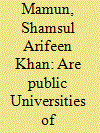

|
|
|
|
|
| Publication |
2011.
|
| Summary/Abstract |
This article empirically estimates a stochastic cost function and thereby estimates local economies of scale and cost-efficiency measures of the public universities in Bangladesh. A flexible quadratic cost function, an unbalanced panel dataset and the maximum likelihood estimation technique have been used in the study. The empirical results show that though the public universities have very high relative efficiency measures, they are scale inefficient.
|
|
|
|
|
|
|
|
|
|
|
|
|
|
|
|
| 2 |
ID:
093094
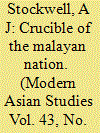

|
|
|
|
|
| Publication |
2009.
|
| Summary/Abstract |
Like so many features of the British Empire, policy for colonial higher education was transformed during the Second World War. In 1945 the Asquith Commission established principles for its development, and in 1948 the Carr-Saunders report recommended the immediate establishment of a university in Malaya to prepare for self-government. This institution grew at a rate that surpassed expectations, but the aspirations of its founders were challenged by lack of resources, the mixed reactions of the Malayan people and the politics of decolonisation. The role of the University of Malaya in engineering a united Malayan nation was hampered by lingering colonial attitudes and ultimately frustrated by differences between Singapore and the Federation. These differences culminated in the university's partition in January 1962. In the end it was the politics of nation-building which moulded the university rather than the other way round.
|
|
|
|
|
|
|
|
|
|
|
|
|
|
|
|
| 3 |
ID:
193026
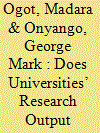

|
|
|
|
|
| Summary/Abstract |
Few studies on developing countries have investigated the alignment of research output to a country’s development agenda and economic productivity. Using evidence from Kenya, this study sought to empirically determine whether the country’s research output is aligned to its development agenda in the first instance and to establish the output’s relationship to economic productivity. Journal publications were used to measure research output. From the analysis, 86% of the publications fell within one or more of the national development priority areas, though 60% were in only 6 of the 35 areas. Several areas had no publications at all during the period under investigation. Furthermore, excluding the health and education sectors, a strong positive relationship was established between the number of publications in different priority areas and those areas’ contribution to Gross Domestic Product. The Government, therefore, needs to avail research funding to research institutions, which, in turn, need to focus their research effort on all identified national development priority areas if Kenya’s development aspirations are to be achieved and the desired economic growth attained.
|
|
|
|
|
|
|
|
|
|
|
|
|
|
|
|
| 4 |
ID:
113997
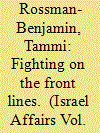

|
|
|
|
|
| Publication |
2012.
|
| Summary/Abstract |
Members of Muslim and pro-Palestinian student organizations and anti-Zionist faculty are the two main sources of anti-Jewish bigotry at the University of California (UC), and their behaviour has had two primary effects: the anti-Semitic language and imagery used by these individuals has caused significant harm to the reputation of Israel and its supporters, both on and off campus; and their behaviour has created a hostile and threatening environment for many Jewish students on UC campuses. Efforts to address the problem of anti-Semitism on UC campuses have generally targeted one of these two effects. These efforts have included: the reactive and proactive campaigns of pro-Israel student and faculty groups, as well as attempts to secure the protection of Jewish students from anti-Semitic harassment through legal means and by applying grassroots pressure on UC administrators. Although none of the efforts has led to a substantial reduction of anti-Semitism on UC campuses, a few of the approaches show some promise.
|
|
|
|
|
|
|
|
|
|
|
|
|
|
|
|
| 5 |
ID:
131899
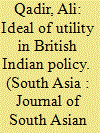

|
|
|
|
|
| Publication |
2014.
|
| Summary/Abstract |
The now natural ideal of defining higher education through its societal utility is a relatively recent historical formation, and in the case of South Asia, its construction is entangled with the colonial history of the institutionalisation of modern higher education in the nineteenth century. Drawing on Robert Young's history of the Bentham-inspired 'chrestomathic' University of London, this article reviews the shifting construction of practicality in British Indian higher education policy in the formative period between 1835 and 1904. The article underlines the continuities and ruptures over time in the policy rhetoric of utility as a normative ideal and points out some implications for understanding colonialism
|
|
|
|
|
|
|
|
|
|
|
|
|
|
|
|
| 6 |
ID:
107199
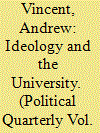

|
|
|
|
|
| Publication |
2011.
|
| Summary/Abstract |
Ideology underpins recent transformations of British universities; it forms an unquestioned backdrop to policy-making. The ideology at issue is a market-based neo-liberalism-accompanied by a doctrinaire private-sector managerialism. Universities employing this ideology envision it as common sense. The ideology is thus not proselytised, but rather structures the vernacular of university speech. In reality it is a highly politicised ideology masquerading as a managerial reality. Its effect on universities has been profoundly destructive. The dignified public good of higher education has now become a huckstering marketised mechanism. What is so perplexing is the quiescence of universities. The ideology is so hegemonic that it appears exempt from criticism. University administrators are now quite unapologetic ideological functionaries and we need to relearn how to criticise those who manage us. Ultimately no ideology lasts, this present one will be supplanted, the question is what level of damage to civil and intellectual life will it inflict?
|
|
|
|
|
|
|
|
|
|
|
|
|
|
|
|
| 7 |
ID:
156784
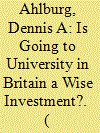

|
|
|
|
|
| Summary/Abstract |
In his recent article in this journal, Alan Ware claimed that for most students higher education was not worth the cost.1 The following evaluates Ware's claim in the context of similar scepticism having been expressed in the media in the UK, the US, and elsewhere. It is argued that this view, and many of the conclusions drawn, is inconsistent with the available empirical evidence on the value of higher education. If students reject higher education because of such views they—and society—will underinvest in higher education.
|
|
|
|
|
|
|
|
|
|
|
|
|
|
|
|
| 8 |
ID:
167045
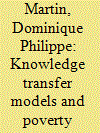

|
|
|
|
|
| Summary/Abstract |
Many government of developing countries show their commitment of reducing extreme poverty. A dominant thought considers that economic growth should be based on capital accumulation, productivity improvement, and access to international markets. This article tracts the system of assumptions that developing countries should meet to ensure that transfer models from developed countries could be efficient. We suggest a rebuilding of the transfer model by identifying some “structuring” conditions of developing countries, in particular by empowering universities to take a central role in the regional development process. From a poverty reduction perspective, the focus should be on the sustainability of local socio-technical systems, even if the options chosen are less efficient in the short term.
|
|
|
|
|
|
|
|
|
|
|
|
|
|
|
|
| 9 |
ID:
179350


|
|
|
|
|
| Summary/Abstract |
This interpretive visual report interacts with repertoires of graffitied messages photographed at two university campuses in Hong Kong after skirmishes laced with tear gas and fire between students and riot police had ceased. This work is a response to several graffitied images taken in early 2020 after the campus siege of 2019. It is accompanied by a reference to the reverberations of recent watershed developments that have fundamentally changed Hong Kong society and the modern-day University's mission to establish coalescence amidst the diversity of ideas.
|
|
|
|
|
|
|
|
|
|
|
|
|
|
|
|
| 10 |
ID:
093249
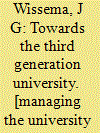

|
|
|
|
|
| Publication |
Cheltenham, Edward Elgar, 2009.
|
| Description |
xviii, 252p.
|
| Standard Number |
9781848442160
|
|
|
|
|
|
|
|
|
|
|
|
Copies: C:1/I:0,R:0,Q:0
Circulation
| Accession# | Call# | Current Location | Status | Policy | Location |
| 054649 | 378.101/WIS 054649 | Main | On Shelf | General | |
|
|
|
|
| 11 |
ID:
156104
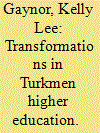

|
|
|
|
|
| Summary/Abstract |
This article consists of two major parts. It begins with a brief summary of the philosophy and history of higher education in Turkmenistan since its independence in 1991. This discussion is based on available mass media accounts and existing research. It also provides some regional comparisons between the Republic of Turkmenistan and its Central Asian neighbours. This part concludes with a description of the current Turkmen higher education landscape. The second part uses an ethnographic case-study approach to describe daily organizational, academic and cultural life, a ‘sense of place’, at one of the several higher education institutions in Turkmenistan which is a pioneer in trying to globalize the system. The case study is particularly focused on changes and challenges associated with moving from a traditionally dominated top-down specialist degree towards the bachelor’s and master’s degree programmes and credit-hour system that this institution is attempting to implement.
|
|
|
|
|
|
|
|
|
|
|
|
|
|
|
|
| 12 |
ID:
110584
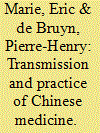

|
|
|
|
|
| Publication |
2011.
|
| Summary/Abstract |
Chinese medicine is a medical system that was developed in China over a long period of time and has subsequently spread over the rest of the world, especially over recent decades. This study aims first to identify this medicine and to examine the changes that accompanied its institutionalisation in the People's Republic of China starting in the 1950's, then to set out the continuities and breaking points that have characterised the ways in which it is transmitted, from traditional apprenticeship training to the development of national university syllabuses. It then looks into the way in which Chinese medicine has faced up to biomedicine and sets out a comparative analysis of the paradigms of these two systems, before describing the way in which this exotic medicine has been received and adapted in the West. This makes it possible to grasp the difficulties and issues involved in its globalisation and the increasingly pressing need, from the perspective of university teaching and research, for a more complete, objective and pragmatic approach to studying it.
|
|
|
|
|
|
|
|
|
|
|
|
|
|
|
|
| 13 |
ID:
107682
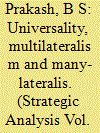

|
|
|
| 14 |
ID:
096395
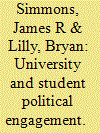

|
|
|
|
|
| Publication |
2010.
|
| Summary/Abstract |
Prior research has identified a substantial positive relationship between college attendance and civic engagement. This article examines student experiences with university academics and ancillary programs to determine which of these, if any, motivate increased student engagement. Various student characteristics were evaluated to determine their impact on student engagement. Data was obtained from the National Survey of Student Engagement (NSSE) and the Current Population Survey (CPS). Results indicated that engagement is related positively to some student college experiences, unrelated to some experiences, and even negatively related to other experiences. Few individual characteristics relate to engagement, ACT scores and gender both impact engagement, and, surprisingly, engagement was higher among men than women.
|
|
|
|
|
|
|
|
|
|
|
|
|
|
|
|
|
|
|
|
|